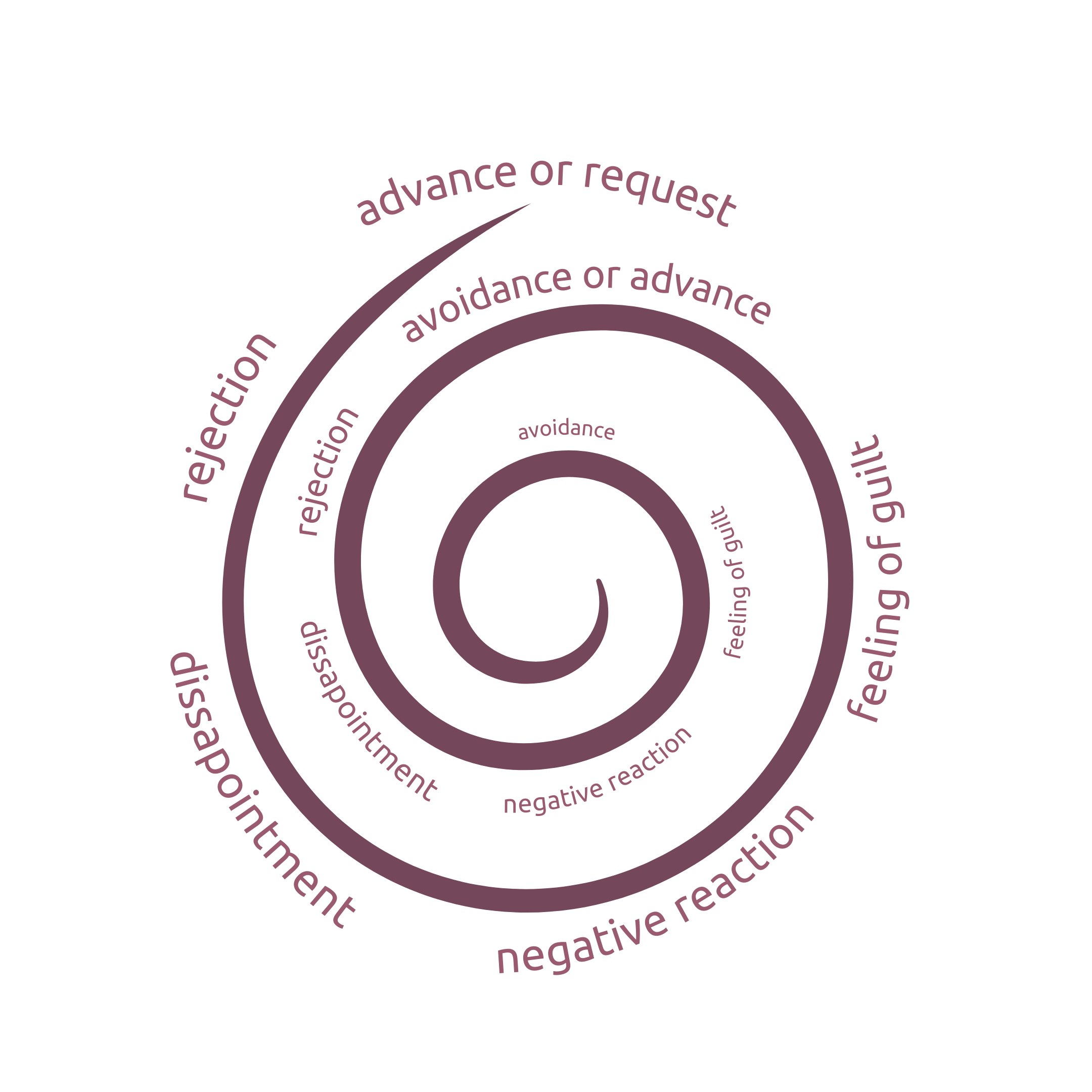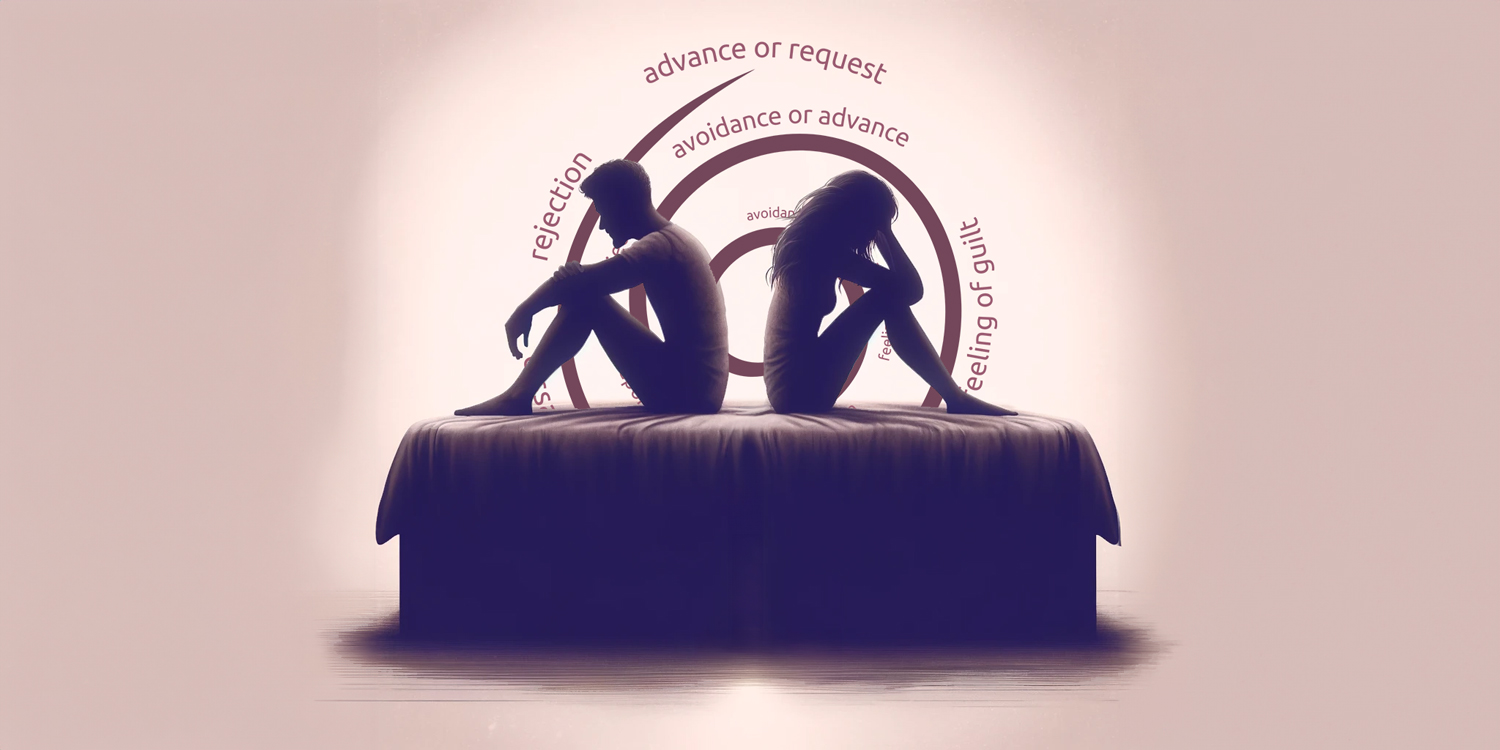Imagine it's Friday evening and both of you are home after a long work week. In the past, this was the time when you'd draw closer to each other, watch a movie together, and enjoy each other's company, often ending in a loving embrace or more. But nowadays, while the TV is on, you sit on one end of the couch and your partner on the other. Both of you are scrolling through your phones, occasionally talking about daily trivialities, but the deeper connection you once had seems far away. You look at your partner and wonder: 'How did we end up here?’
You are certainly not alone. Many couples struggle to maintain connection and intimacy. It's normal for the quantity, intensity, and quality of sex to vary. There are many factors that influence this. However, when it comes to a continuous concern causing tension and frustration, it's good to take a critical look.
In my experience as a sexologist, there is often a significant factor that can cause relationship problems due to lack of intimacy and lack of sex to persist. It is the spiral of rejection, disappointment, and guilt that causes individuals in a relationship to increasingly lose connection, both physically and mentally.
In this article, we explore how the spiral of rejection, disappointment, and guilt often leads to reduced intimacy and what you can do to break this cycle and restore the connection.
How Does the Spiral Originate and How Does It Work?
The spiral of rejection, disappointment, and guilt can arise in various ways, but usually, it goes something like this. You make an advance or suggest a (usually sexual) activity. Your partner responds with a rejection (at least in your view). You, in turn, react negatively. This could be by getting angry, becoming silent and withdrawing, being sad, or another negative or at least negatively interpreted reaction.
The result is that the partner in question feels guilty and has a negative association with the situation and the request that was made. The result of this, especially when this behavior occurs more frequently, is that situations where the same or similar requests or advances can be made are avoided. I mean, either I have to agree to something I don't want, or I have to say no again, and then (insert negative reaction here) happens again.

And so, the spiral of rejection, disappointment, and guilt is born. From here, the chances are high that it will only be reinforced and the longer this spiral exists, the harder it becomes to break. But, it is certainly not impossible!
Rejection Is About the Context, Not About You
At the heart of the spiral is the feeling of rejection. Nobody wants to be rejected or feel that way; it is one of the most unpleasant feelings according to many. But what's important to realize is that the rejection or rather the "no" to the proposal, 9 out of 10 times, is not about you, but about the context.
We usually don't say no to the person, but to the situation. No doesn't mean: "I don't want you," but rather: "I don't want this specific thing at this moment, in this environment, in this setting, etc.”
"if a proposal is rejected, go back to the last thing you did together that was nice."
And of course, sometimes a rejection is personal, but in a relationship, that's usually not what it's about. So what should we do with the rejection?
The most important thing is how you handle it. Prefer to respond with understanding and love rather than with sadness or anger. This is precisely the moment when your partner needs you. As a rule of thumb, I would suggest: if a proposal is rejected, go back to the last thing you did together that was nice.
Break the Script
The next part of the spiral is about expectations and the sexual script that you have built together, or that you have learned over the years. Whether it comes from previous relationships, watching pornography, or a script built around all the things you're not supposed to do, such as out of shame, for example. Every person has a script around which sexual interactions are engaged, understood, and communicated.
"The problem with a sexual script are the expectations that are consciously or unconsciously linked to certain behaviors and actions."
In its core, there's nothing wrong with a sexual script, it provides safety and predictability (in a positive sense of the word). It ensures that you can read hints and advances from a partner and respond in an appropriate way. Plus, you might also know exactly what you and your partner like, and that's part of your script. This increases the chance of a pleasant experience.
But… there is of course another side to a fixed sexual script. And I'm not even talking about predictability in a negative sense that can arise. No, the problem with a sexual script are the expectations that are consciously or unconsciously linked to certain behaviors and actions. And the stress this can cause.
Suppose you have a certain way of letting your partner know that you are in the mood for sex and intimacy. If you exhibit this behavior, your partner will immediately know that you want sex. If the context is not right or there is a negative association with sex and intimacy, then this immediately triggers a stress reaction. The idea of: "Oh no, it must happen again.”
That's one part, the other is the idea that according to a sexual script, one action always leads to the next action. Often there is a sequence, a buildup so to say of sexual actions. For many people, this often must always lead to what is called the end goal: often penetration and orgasm. Apart from the fact that this does not have to be the end goal, the sexual script creates the situation that starting with the first action gives the pressure to end with the last. If that or the actions in between are stressful or there is a negative association with it, this is a moment when the spiral of rejection, disappointment, and guilt is put into action.
"This gives room to break the script and the possibility to explore what you both enjoy in your intimate relationship."
What should I do about it, you might ask? Start by looking if you are following a sexual script, then see if you can also be more flexible with it. Does it always have to lead to an end goal? Can the order be different, can I "stop halfway" and still have had a pleasant sexual experience?
In many cases, this is easiest to investigate by taking the pressure off sexual actions. A useful tool here is a temporary ban on sex. What I mean by that, the end goal is forbidden. Suppose this is penetration, then you agree to have no penetrative sex for the coming (choose a period, but start with a month for example), no matter how much both of you might want it. This gives room to break the script and the possibility to explore what you both enjoy in your intimate relationship.
In Closing
The circle of rejection, disappointment, and guilt is, in my professional opinion, at the root of many sexual concerns within relationships. The approaches described above can certainly help, and I invite you to share and discuss this article and try the exercises. Take your time for this and communicate openly, these concerns are not solved overnight.
Should you not be able to figure it out or if you would like help with the above or other relational or sexual concerns? Then, of course, you can always contact me for an intake interview. I am happy to help.
Best of luck and don't forget to enjoy.
